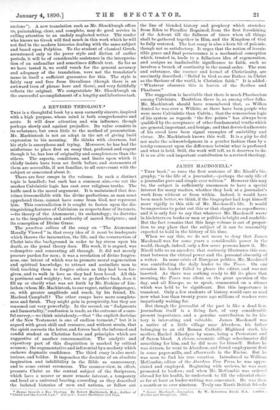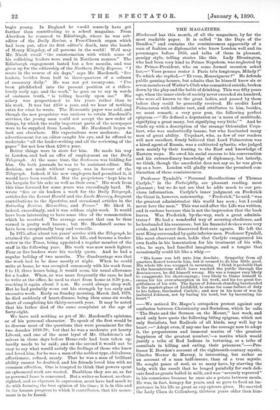JAMES MACD 0 NELL .* " Tins book," so runs
the first sentence of Mr. Nicoll's bio- graphy, "is the life of a journalist,—perhaps the only life of a journalist pure and simple ever written." However this may be, the subject is sufficiently uncommon to have a special interest for many readers, whether they look at a journalist's work from without or from within. Indeed, it would have been much better, we think, if the biographer had kept himself more rigidly to this side of Mr. Macdonell's life. It would be ungracious to point out this or that chapter as superfluous ; and it is only fair to say that whatever Mr. Macdonell wrote in his letters on books or men or politics is bright and readable. But the fact remains that this large volume is out of propor- tion to any place that the subject of it can be reasonably expected to hold in the history of his time.
When we say this, we do not mean to deny that James Macdonell was for some years a considerable power in the world, though, indeed, only a few score persons knew it. Mr_ Nicoll tells us an anecdote that curiously illustrates this con- trast between the virtual power and the personal obscurity of a writer. In some crisis of European politics, Mr. Macdonell was contributing the daily leader to the Times. On one occasion his leader failed to please the editor, and was not inserted. As there was nothing ready to fill its place that morning, the Times was silent on the great question of the day, and all Europe, so to speak, commented on a silence which was held to be significant. But this importance is transient. Only a few students of history would care to read now what less than twenty years ago millions of readers were impatiently waiting for.
But though the journalist of the past is like a dead lion, journalism itself is a living fact, of very considerable present importance, and a genuine contribution to its his- tory is interesting and valuable. James Macdonell was a native of a little village near Aberdeen, his father belonging to an old Roman Catholic Highland stock, his mother, Rachel Allardyce by name, being a Protestant and of Saxon blood. A clever, eccentric village schoolmaster did something for him, and he did more for himself. Before he was sixteen, he went to Aberdeen, and found employment first in some paper-mills, and afterwards in the Excise. But he was soon to find his true vocation. Introduced to William, McCombie, editor of the Aberdeen Free Press, he was appre- ciated and employed. Beginning with reviews, he was soon. promoted to leaders ; and when Mr. McCombie was ordered abroad for his health, he undertook to fill the editorial chair,. as far at least as leader-writing was concerned. He was then a month or so over nineteen. Truly our North British friends.
• James Macdonell, Journalist. By W. Robertson Nicoll, M.A. London : Hodder and Stoughton. 1550.
begin young. In England he would scarcely have got further than contributing to a school magazine. From Aberdeen he removed to Edinburgh, where he was sub- editor of the Daily Review, a Free-Church organ which had been put, after its first editor's death, into the hands of Henry Kingsley, of all persons in the world! Well may Mr. Nicoll recall " the consternation with which some of his rollicking leaders were read in Northern manses." The Edinburgh engagement lasted but a few months, and was given up for the editorship of the Northern Daily Express. "I wrote in the course of six days," says Mr. Macdonell, "five leaders, besides from half to three-quarters of a column of summary daily." He was not yet twenty-one. " I've been pitchforked into the present position at a ridicu- lously early age, and the work," he goes on to say in words of ominous truth, " is telling heavily upon me." His salary was proportioned to bis years rather than to his work. It was but £150 a year, and we hear of nothing extra for what he wrote. The Newcastle paper was sold, and though the new proprietor was anxious to retain Macdonell's services, the young man could not accept the new order of things, by which the really important parts of the newspaper were to be supplied from London. Mr. Macdonell began to look out elsewhere. His expectations were moderate. An advertisement for an editor caught his eye, and he offered to undertake "all the leader-writing and all the reviewing of the paper " for not less than £200 a year.
Better things were in store for him. He made his way to London, and had an offer of employment on the Daily Telegraph. At the same time, the Scotsman was bidding for him. On both journals he was to be assistant-editor. His decision, not made without regret, was in favour of the Telegraph. Indeed, if his new employers had permitted it, it would have been recalled. But the proprietors " kept him to his bargain for his sake as well as their own." His work from this time forward for some years was exceedingly hard. He wrote " five or six leaders a week for the Daily Telegraph, articles for the Levant Herald and the Leeds Mercury, frequent contributions to the Spectator, and occasional articles in the Saturday Review, Macmillan, and Fraser." He liked it, indeed, exceedingly, and it was seldom night-work. It would have been interesting to have some idea of the remuneration which he received. The average amount that can be thus earned is pretty well known ; but Mr. Macdonell seems to have been exceptionally busy and versatile.
In 1875, after about ten years' service with the Telegraph, he attained the great ambition of his life, and became a leader- writer in the Times, being appointed a regular member of the staff in the following year. His work was now much lighter. Four or five leaders were his weekly quota. And he had a regular holiday of two months. The disadvantage was that the work had to be done mostly at night. When he could write at home, he was occupied commonly with his work from 8 to 11, three hours being, it would seem, his usual allowance for a leader. When, as was more frequently the case, he had to write at the office, he used to start from home at 9.30 p.m., reaching it again about 3 a.m. He could always sleep well. But he had probably worn out his strength by too early and excessive work. Early on Sunday morning, March 2nd, 1879, he died suddenly of heart-disease, being then some six weeks short of completing his thirty-seventh year. It may be noted that his father died of the same complaint at the age of forty-eight.
We have said nothing as yet of Mr. Macdonell's opinions, or of his personal character. To speak of the first would be to discuss most of the questions that were prominent for the two decades 1859-79; but that he was a moderate yet hearty Liberal, and one of the most loyal of Mr. Gladstone's ad- mirers in those days before Home-rule had been taken up, hardly needs to be said ; and on the second it would not be easy to say what would satisfy the feelings of those who knew and loved him, for he was a man of the noblest type, chivalrous, affectionate, refined, manly. That he was a man of brilliant ability cannot be doubted, and his friends loved him with no common affection. One is tempted to think that powers spent on ephemeral work are wasted. Doubtless they are so, as far as personal fame is concerned. But a writer so honest, so clear- sighted, and so vigorous in expression, must have had much to do with forming the best opinion of his time ; it is in this and in the human progress to which it contributes, that his monu- ment is to be found.















































 Previous page
Previous page